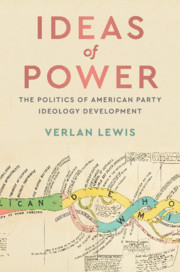Crossref Citations
This Book has been
cited by the following publications. This list is generated based on data provided by Crossref.
Lewis, Verlan
2021.
The problem of Donald Trump and the Static Spectrum Fallacy.
Party Politics,
Vol. 27,
Issue. 4,
p.
605.
Argyle, Daniel
Argyle, Lisa P.
Eidelman, Vlad
and
Resnik, Philip
2021.
Debate Reaction Ideal Points: Political Ideology Measurement Using Real-Time Reaction Data.
Statistics, Politics and Policy,
Vol. 12,
Issue. 1,
p.
5.
Malpas, Amelia
and
Hilton, Adam
2021.
Retreating from Redistribution? Trends in Democratic Party Fidelity to Economic Equality, 1984-2020.
SSRN Electronic Journal ,
Malpas, Amelia
and
Hilton, Adam
2021.
Retreating from Redistribution? Trends in Democratic Party Fidelity to Economic Equality, 1984–2020.
The Forum,
Vol. 19,
Issue. 2,
p.
283.
Bryan, James D.
and
Tama, Jordan
2022.
The prevalence of bipartisanship in U.S. foreign policy: an analysis of important congressional votes.
International Politics,
Vol. 59,
Issue. 5,
p.
874.
Anzia, Sarah F.
2022.
Interest groups in US local politics: Introduction to the special issue.
Interest Groups & Advocacy,
Vol. 11,
Issue. 2,
p.
179.
Dionne, Lee E.
2022.
Who Sponsors the President's Program in the Opposition's House?.
Presidential Studies Quarterly,
Vol. 52,
Issue. 4,
p.
875.
Glaser, James M
Berry, Jeffrey M
and
Schildkraut, Deborah J
2023.
Ideology and Support for Federalism in Theory—And in Practice.
Publius: The Journal of Federalism,
Vol. 53,
Issue. 4,
p.
511.
Lucas, Jack
2023.
The Ideological Structure of Municipal Non-Ideology.
Urban Affairs Review,
Vol. 59,
Issue. 1,
p.
275.
Bryan, James
and
Tama, Jordan
2024.
Polarization and US Foreign Policy.
p.
189.



